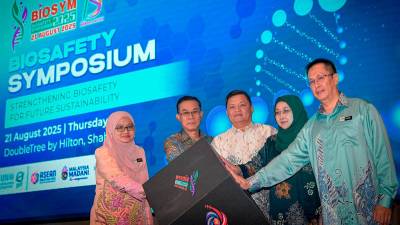SHAH ALAM: The Ministry of Natural Resources and Environmental Sustainability is enhancing capacity-building initiatives and strategic partnerships to address the shortage of skilled professionals in biosafety risk assessment and regulatory enforcement.
Deputy Minister Datuk Seri Huang Tiong Sii revealed that the Department of Biosafety currently employs only a small number of qualified technical officers and scientists with expertise in evaluating genetically modified organisms risk.
He noted that rapid advancements in modern biotechnology have led to an increasing presence of living modified organisms and GMOs across agriculture and healthcare sectors.
“The growing awareness of our biosafety legislation has led to a surge in applications from universities and research institutions,” he stated during his speech at the Biosafety Symposium.
Huang explained that this compliance surge places tremendous pressure on their limited pool of technical officers and scientists.
“The challenge is compounded by the need to assess GMO products intended for food, feed and processing, where delays could have serious implications for food security and service delivery to stakeholders,” he added.
The ministry is reviewing the Biosafety Act 2007 to ensure it remains responsive to emerging technologies and regulatory grey areas.
Other measures include investing in advanced screening technologies, enhancing laboratory capabilities, and strengthening collaboration with expert organisations.
The government is improving inter-agency coordination in surveillance, intelligence, and data sharing while restructuring the Department of Biosafety for better regulatory effectiveness.
“Globally, gene-editing technologies like CRISPR-Cas9 have given rise to products that blur traditional GMO definitions, creating regulatory grey areas,” Huang observed.
He noted that gene-edited crops containing no foreign DNA cannot be detected using conventional methods, posing major challenges for developing countries like Malaysia.
The ease with which GMO products move through informal trade routes and e-commerce platforms further complicates monitoring efforts.
Huang stressed the need for Malaysia and other ASEAN members to lead in harnessing innovation responsibly without compromising public health or biodiversity.
The event featured an exchange of strategic cooperation documents with the Malaysian Border Control and Protection Agency to strengthen Biosafety Act enforcement.
This collaboration reinforces control over GMOs at entry points while enhancing officer training and improving data sharing procedures. – Bernama
